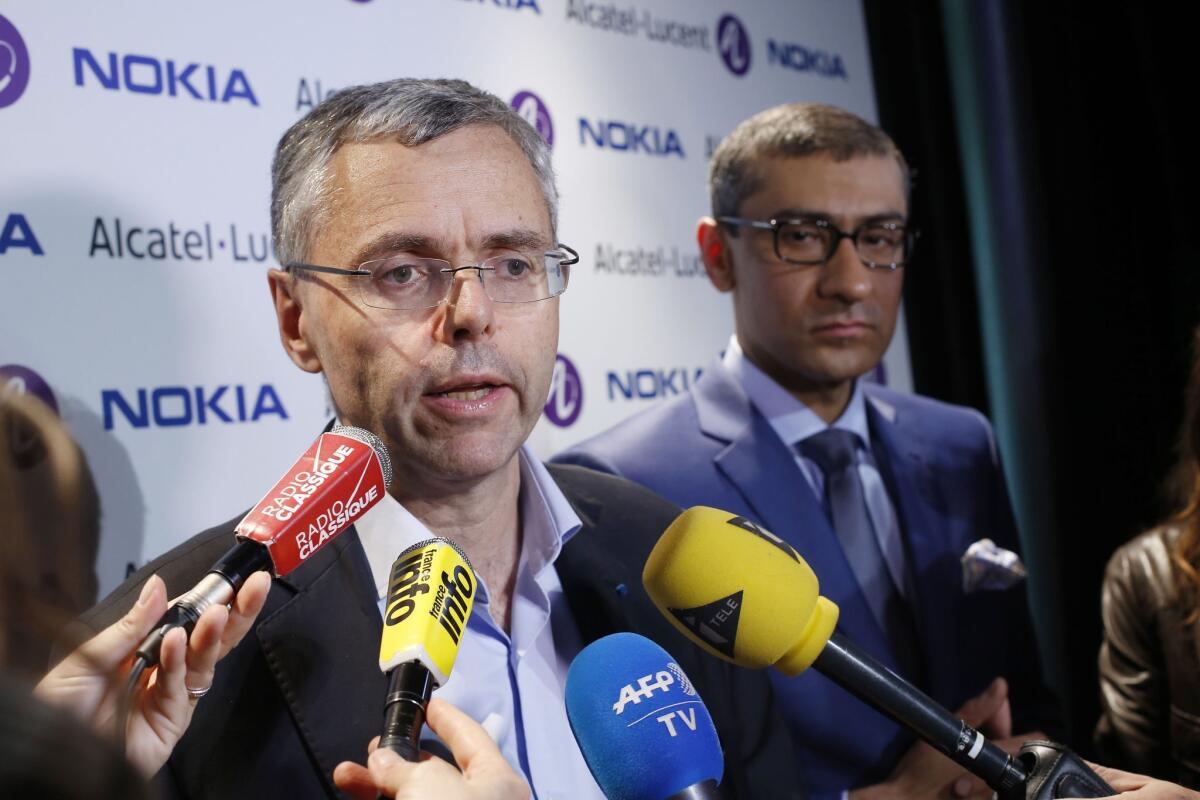Nokia aims to become telecom equipment leader with Alcatel-Lucent deal

Alcatel-Lucent Chief Executive Michel Combes, left, and Nokia Chief Executive Rajeev Suri announce Nokia is buying its French rival.
Nokia Corp., once a household name as the leading seller of cellphones, agreed to buy a major rival in its effort to remake itself into a global leader in another telecom field.
With the onset of smartphones, the Finnish firm had fallen behind fast-growing players such as Samsung Electronics Co. and Apple Inc. and, last year, sold its mobile-phone business to Microsoft Corp.
Now, a refashioned Nokia said Wednesday it would acquire French rival Alcatel-Lucent for $16.5 billion in stock, taking a big step toward being a leading provider of telecommunications equipment and services.
The company’s goal is to make it a stronger competitor against Ericsson of Sweden, Huawei Technologies Co. of China and network routing giant Cisco Systems Inc. in San Jose.
All make the complex networks and other electronic guts, invisible to most consumers, that enable smartphones and other telecom and data-storage products and services to work quickly and effectively.
Nokia’s U.S. customers include Sprint Corp. and T-Mobile US Inc., while Alcatel-Lucent counts AT&T Inc. and Verizon Communications Inc. among its customers.
Expected to be completed in the first half of next year, the deal is aimed at giving the combined Nokia and Alcatel-Lucent a stronger, broader array of products and services to sell while eliminating redundant costs to bolster the merged company’s financial health.
Nokia, for instance, would gain access to Alcatel-Lucent’s Internet-routing technologies that would add to Nokia’s wireless products.
“Consumers are looking to access data, voice and video across networks of all kinds,” the companies said in announcing the deal. “In this environment, technology that used to operate independently now needs to work well together.”
Nokia also would gain access to Alcatel-Lucent’s famed Bell Labs research arm. The merged company overall would have nearly 110,000 employees worldwide and annual sales of about $27.5 billion.
The deal capped years of potential talks between the companies to merge all or part of their operations. It also came one day after the companies’ chief executives met with French President Francois Hollande in Paris.
Rajeev Suri, Nokia’s chief executive, would maintain that role with the newly merged company. He said the transaction is “the right deal, with the right logic, at the right time.”
For Alcatel-Lucent, a company struggling to find a profitable footing, the focus now will be on development and growth, said its chief executive, Michel Combes.
“We had difficult periods, but now we are one of the building bricks for what will become a global technology giant,” he said on France’s Europe-1 radio. “Nokia is becoming today the leader of telecommunications networks thanks to Alcatel-Lucent.”
Nokia and Alcatel-Lucent have struggled to smoothly implement prior mergers, and after their announcement Wednesday, analysts and investors signaled they were wary about how well this merger would be executed.
The proposal calls for Nokia to issue 0.55 share of stock for each Alcatel-Lucent share outstanding. Nokia stockholders would own 66.5% of the combined company with the balance owned by Alcatel-Lucent holders.
Alcatel-Lucent’s stock, which had jumped in recent days amid speculation a deal was imminent, tumbled 91 cents, or 18.5%, to $4.02 a share in U.S. trading Wednesday. Nokia’s stock fell 12 cents, or 1.5%, to $7.84.
The merger “is long-term strategically correct but highly risky,” Marketwatch.com quoted analyst Mathias Lundberg of Swedbank as saying. “The true picture will only emerge in a couple of years.”
In the meantime, the companies’ goal of eliminating overlapping expenses could mean job cuts and casting off some divisions.
Indeed, Nokia said Wednesday that it would conduct a strategic review of its mapping business, called Here, which could lead to its divestiture.
The Associated Press contributed to this report.
More to Read
Inside the business of entertainment
The Wide Shot brings you news, analysis and insights on everything from streaming wars to production — and what it all means for the future.
You may occasionally receive promotional content from the Los Angeles Times.











